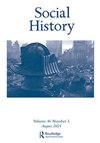Coping with a post-war world: Protestant student internationalism and humanitarian work in Central and Eastern Europe during the 1920s
IF 1.1
1区 历史学
Q1 HISTORY
引用次数: 0
Abstract
ABSTRACT This article explores the political and social contexts in which Protestant student internationalism gave rise to a particular vision of students’ basic needs and responsibilities that was closely entwined with the violent disruption of the continental empires in the context of the First World War. To this end, it focuses on European Student Relief (ESR), a branch of the World Student Christian Federation. ESR was founded in 1920 to provide humanitarian assistance to students in Central and Eastern Europe. From 1922 onwards, it gradually transformed into International Student Service, an interconfessional movement with global ambitions. The article focuses on this transformation process during which the denominational aspect of pre-war Protestant student internationalism gave way to an earthly vision of educational mobility that sought to counterbalance the political upheavals of the early post-war years – the violent emergence of the ethnically defined nation state and the continuance of colonial hierarchies and differences. The article makes the case for a global social history of higher education that conceptualises student activism from the perspective of Central and Eastern Europe, that discusses the entanglement of political transformations and social issues in terms of distress, ethnicity and ‘race’, and that connects humanitarianism with educational mobility.应对战后世界:20世纪20年代中欧和东欧新教学生的国际主义和人道主义工作
本文探讨了新教学生国际主义在政治和社会背景下产生的学生基本需求和责任的特殊愿景,这与第一次世界大战背景下大陆帝国的暴力破坏密切相关。为此,它把重点放在欧洲学生救济(ESR)上,这是世界学生基督教联合会的一个分支机构。ESR成立于1920年,旨在为中欧和东欧的学生提供人道主义援助。从1922年起,它逐渐转变为国际学生服务,一个具有全球野心的教派间运动。本文关注的是这一转变过程,在此过程中,战前新教学生国际主义的宗派方面让位给世俗的教育流动性愿景,这种愿景试图抵消战后早期的政治动荡——种族界定的民族国家的暴力出现以及殖民等级制度和差异的延续。这篇文章从中欧和东欧的角度对学生激进主义进行了概念化,讨论了政治变革和社会问题在痛苦、种族和“种族”方面的纠缠,并将人道主义与教育流动性联系起来。
本文章由计算机程序翻译,如有差异,请以英文原文为准。
求助全文
约1分钟内获得全文
求助全文
来源期刊

Social History
HISTORY-
CiteScore
1.10
自引率
0.00%
发文量
37
期刊介绍:
For more than thirty years, Social History has published scholarly work of consistently high quality, without restrictions of period or geography. Social History is now minded to develop further the scope of the journal in content and to seek further experiment in terms of format. The editorial object remains unchanged - to enable discussion, to provoke argument, and to create space for criticism and scholarship. In recent years the content of Social History has expanded to include a good deal more European and American work as well as, increasingly, work from and about Africa, South Asia and Latin America.
 求助内容:
求助内容: 应助结果提醒方式:
应助结果提醒方式:


